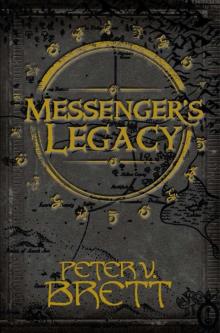- Home
- Peter V. Brett
The Warded Man Page 19
The Warded Man Read online
Page 19
He gestured at a man wrapped in rough, filthy cloth holding out a cracked wooden bowl to passersby, who moved to avoid him, refusing eye contact. “So unless you’re a Royal or a Holy Man, if you don’t work, you end up like that.”
Arlen nodded as if he understood, but he didn’t really. People ran out of credits at the general store in Tibbet’s Brook all the time, but even Hog didn’t let them starve.
They came to a house, and Ragen signaled Arlen to stop the cart. It was not a large house compared to many Arlen had seen in Miln, but it was still impressive by Tibbet’s Brook standards, made entirely of stone and standing two full stories.
“Is this where you live?” Arlen asked.
Ragen shook his head. He dismounted and went to the door, knocking sharply. A moment later, it was answered by a young woman with long brown hair woven into a tight braid. She was tall and sturdy, like everyone in Miln, and wore a high-necked dress that fell to her ankles and was tight across her bosom. Arlen couldn’t tell if she was pretty. He was about to decide that she was not when she smiled, and her whole face changed.
“Ragen!” she cried, throwing her arms around him. “You came! Thank the Creator!”
“Of course I came, Jenya,” Ragen said. “We Messengers take care of our own.”
“I’m no Messenger,” Jenya said.
“You were married to one, and that’s the same. Graig died a Messenger, the guild’s ruling be damned.”
Jenya looked sad, and Ragen changed the subject quickly, striding over to the cart and unloading the remaining stores. “I’ve brought you good Marsh rice, salt, meat, and fish,” he said, carrying the items over and setting them just inside her doorway. Arlen scurried to help.
“And this,” Ragen added, pulling the sack of gold and silver he had gotten from Hog out of his belt. He threw in the little pouch from the duke’s merchant, as well.
Jenya’s eyes widened as she opened it. “Oh, Ragen,” she said, “it’s too much. I can’t …”
“You can and you will,” Ragen ordered, cutting her off. “It’s the least I can do.”
Jenya’s eyes filled with tears. “I have no way to thank you,” she said. “I’ve been so scared. Penning for the guild doesn’t cover everything, and without Graig … I thought I might have to go back to begging.”
“There, there,” Ragen said, patting her shoulder. “My brothers and I will never let that happen. I’ll take you into my own household before I let you fall so far,” he promised.
“Oh, Ragen, you would do that?” she asked.
“There’s one last thing,” Ragen said. “A gift from Rusco Hog.” He held up the ring. “He wants you to write him, and let him know you got it.”
Jenya’s eyes began to water again, looking at the beautiful ring.
“Graig was well loved,” Ragen said, slipping the ring onto her finger. “Let this ring be a symbol of his memory. The food and money should last your family a good long while. Perhaps, in that time, you’ll even find another husband and become a Mother. But if things ever grow so dark that you feel you must sell that ring, you come to me first, you understand?”
Jenya nodded, but her eyes were down, still dripping as she caressed the ring.
“Promise me,” Ragen ordered.
“I promise,” Jenya said.
Ragen nodded, hugging her one last time. “I’ll look in on you when I can,” he said. She was still crying as they left. Arlen stared back at her as they went.
“You look confused,” Ragen said.
“I guess I am,” Arlen agreed.
“Jenya’s family were Beggars,” Ragen explained. “Her father is blind and her mother sickly. They had the fortune, though, to have a healthy, attractive daughter. She brought herself and her parents up two classes when she married Graig. He took the three of them into his home, and though he never had the choicest routes, he made enough for them to get by and be happy.”
He shook his head. “Now, though, she has rent to pay and three mouths to feed on her own. She can’t stray far from home, either, because her parents can’t do for themselves.”
“It’s good of you to help her,” Arlen said, feeling a little better. “She was pretty when she smiled.”
“You can’t help everyone, Arlen,” Ragen said, “but you should make every effort to help those you can.” Arlen nodded.
They wound their way up a hill until they reached a large manse. A gated wall six feet high surrounded the sprawling property, and the great house itself was three stories high and had dozens of windows, all reflecting light from their glass. It was bigger than the great hall on Boggin’s Hill, and that could hold everyone in Tibbet’s Brook for the solstice feast. The manse and the wall around it were painted with brightly colored wards. Such a magnificent place, Arlen decided, must be the home of the duke.
“My mam had a cup of warded glass, hard as steel,” he said, looking up at the windows as a thin man came scurrying up from inside the grounds to open the gate. “She kept it hidden, but sometimes she took it out when company came, to show how it glittered.” They rode past a garden untouched by coreling mischief, where several hands were digging vegetables.
“This is one of the only manses in Miln with all glass windows,” Ragen said proudly. “I’d pay a lot to ward them not to break.”
“I know the trick,” Arlen said, “but you need a coreling to touch the glass to charge it.”
Ragen chuckled and shook his head. “Maybe not, then.”
There were smaller buildings on the grounds as well, stone huts with smoking chimneys and people going to and fro, like a tiny village. Dirty children scampered about, and women kept watch over them while tending their chores. They rode to the stables, and a groom was there in a second to take Nighteye’s reins. He bowed and scraped to Ragen as if Ragen were a king in a story.
“I thought we were going to stop by your house before visiting the duke,” Arlen asked.
Ragen laughed. “This is my house, Arlen! Do you think I risk the open road for nothing?”
Arlen looked back at the house, his eyes bulging. “This is all yours?” he asked.
“All of it,” Ragen confirmed. “Dukes are free with their coin to those who stare down corelings.”
“But Graig’s house was so small,” Arlen protested.
“Graig was a good man,” Ragen said, “but he was never more than a passable Messenger. He was content to make a run to Tibbet’s Brook each year, and shuttle to the local hamlets in between. A man like that might support his family, but no more. The only reason there was so much profit for Jenya was that I paid for the extra goods I sold Hog out of my own purse. Graig used to have to borrow from the guild, and they took a hard cut.”
A tall man opened the door to the house with a bow. He was stone-faced, wearing a faded blue coat of dyed wool. His face and clothes were clean, a sharp contrast to those in the yard. As soon as they entered, a boy not much older than Arlen sprang to his feet. He ran to a bell rope at the base of a broad, marble stair. Chimes rang through the house.
“I see your luck has held one more time,” a woman called a moment later. She had dark hair and piercing blue eyes. She wore a deep blue gown, finer than anything Arlen had ever seen, and her wrists and throat sparkled with jewels. Her smile was cold as she regarded them from the marble balcony above the foyer. Arlen had never seen a woman so beautiful or graceful.
“My wife, Elissa,” Ragen advised quietly. “A reason to return … and a reason to leave.” Arlen was unsure if he was joking. The woman did not seem pleased to see them.
“One of these times, the corelings will have you,” Elissa said as she descended the stairs, “and I will finally be free to wed my young lover.”
“Never happen,” Ragen said with a smile, drawing her close for a kiss. Turning to Arlen, he explained, “Elissa dreams of the day when she will inherit my fortune. I guard against the corelings as much to spite her as to protect myself.”
Elissa laughed, and Arlen relax
ed. “Who is this?” she asked. “A stray to save you the work of filling my belly with a child of our own?”
“The only work is melting your frozen petticoats, my dear,” Ragen shot back. “May I present Arlen, of Tibbet’s Brook. I met him on the road.”
“On the road?” Elissa asked. “He’s just a child!”
“I’m not a child!” Arlen shouted, then immediately felt foolish. Ragen eyed him wryly, and he dropped his gaze.
Elissa gave no sign that she heard the outburst. “Doff your armor and find the bath,” she ordered her husband, “you smell like sweat and rust. I’ll see to our guest.”
As Ragen left, Elissa called a servant to prepare Arlen a snack. Ragen seemed to have more servants than there were people in Tibbet’s Brook. They cut him slices of cold ham and a thick crust of bread, with clotted cream and milk to wash it down. Elissa watched him eat, but Arlen couldn’t think of anything to say, and kept his attention on his plate.
As he was finishing the cream, a serving woman in a dress of the same blue as the men’s jackets entered and bowed to Elissa. “Master Ragen awaits you upstairs,” she said.
“Thank you, Mother,” Elissa replied. Her face took on a strange cast for a moment, as she absently ran her fingers over her stomach. Then she smiled and looked at Arlen. “Take our guest to the bath,” she ordered, “and don’t let him up for air until you can tell what color his skin is.” She laughed and swept out of the room.
Arlen, used to standing in a trough and dumping cold water over himself, was out of sorts at the sight of Ragen’s deep stone tub. He waited as the serving woman, Margrit, poured a kettle of boiling water in to take the chill from his soak. She was tall, like everyone in Miln, with kind eyes and honey-colored hair just hinting at gray peeking from underneath her bonnet. She turned her back while Arlen undressed and got into the tub. She gasped as she saw the stitched wounds on his back, and quickly moved to inspect them.
“Ow!” Arlen shouted as she pinched the uppermost wound.
“Don’t be such a baby,” she scolded, rubbing her thumb and forefinger together and sniffing at them. Arlen bit down as she repeated the process down his back. “You’re luckier than you know,” she said at last. “When Ragen told me you were hurt, I thought it must be just a scratch, but this …” She tsked at him. “Didn’t your mother teach you not to be outside at night?”
Arlen’s retort died on a sniffle. He bit his lip, determined not to cry. Margrit noticed, and immediately softened her tone. “These are healing well,” she said of his wounds. She took a cake of soap and began to gently wash them. Arlen gritted his teeth. “When you’re done in the bath, I’ll prepare a poultice and fresh bandages for you.”
Arlen nodded. “Are you Elissa’s mother?” he asked.
The woman laughed. “Creator, boy, whatever gave you that idea?”
“She called you ‘Mother,’” Arlen said.
“Because I am,” Margrit said proudly. “Two sons and three daughters, one of them soon to be a Mother herself.” She shook her head sadly. “Poor Elissa, all her wealth, and still a Daughter, and her on the dark side of thirty! It breaks the heart.”
“Is being a mam so important?” Arlen asked.
The woman regarded him as if he had asked if air were important. “What could be more important than motherhood?” she asked. “It’s every woman’s duty to produce children to keep the city strong. That’s why Mothers get the best rations and first pick of the morning market. It’s why all the duke’s councilors are Mothers. Men are good for breaking and building, but politics and papers are best left to women who’ve been to the Mothers’ School. Why, it’s Mothers that vote to choose a new duke when the old one passes!”
“Then why ent Elissa one?” Arlen asked.
“It’s not for lack of trying,” Margrit admitted. “I’ll wager she’s at it right now. Six weeks on the road will make any man a bull, and I brewed fertility tea and left it on her nightstand. Maybe it will help, though any fool knows the best time to make a baby is just before dawn.”
“Then why haven’t they made one?” Arlen asked. He knew making babies had something to do with the games Renna and Beni had wanted to play, but he was still vague on the process.
“Only the Creator knows,” Margrit said. “Elissa might be barren, or it might be Ragen, though that would be a shame. There’s a shortage of good men like him. Miln needs his sons.”
She sighed. “Elissa’s lucky he hasn’t left her, or gotten a child on one of the servant girls. Creator knows, they’re willing.”
“He would leave his wife?” Arlen was aghast.
“Don’t look so surprised, boy,” Margrit said. “Men need heirs, and they’ll get them any way they can. Duke Euchor is on his third wife, and still only daughters to show for it!”
She shook her head. “Not Ragen, though. They fight like corelings sometimes, but he loves Elissa like the sun itself. He’d never leave. Nor Elissa, despite what she’s given up.”
“Given up?” Arlen asked.
“She was a Noble, you know,” Margrit said. “Her mother is on the Duke’s Council. Elissa could have served the duke, too, if she’d married another Noble and got with child. But she married down to be with Ragen, against her mother’s wishes. They haven’t spoken since. Elissa’s Merchant now, if well moneyed. Denied the Mothers’ School, she’ll never hold any position in the city, much less one in the duke’s service.”
Arlen was quiet while Margrit rinsed out his wounds and collected his clothes off the tiles. She tsked as she inspected the rips and stains. “I’ll mend these as best I can while you soak,” she promised, and left him to his bath. While she was gone, Arlen tried to make sense of everything she had told him, but there was too much he didn’t understand.
Margrit reminded Arlen a little of Catrin Hog, Rusco’s daughter. “She’d tell you every secret in the world, if it let her hear her own voice a moment longer,” Silvy used to say.
The woman returned later with fresh if ill-fitting clothes. She bandaged his wounds and helped him dress, despite his protests. He had to roll up the tunic sleeves to find his hands, and cuff his breeches to keep from tripping, but Arlen felt clean for the first time in weeks.
He shared an early supper with Ragen and Elissa. Ragen had trimmed his beard, tied back his hair, and donned a fine white shirt with a deep blue suede jacket and breeches.
A pig had been slaughtered on Ragen’s arrival, and the table was soon laden with pork chops, ribs, rashers of bacon, and succulent sausage. Flagons of chilled ale and clear, cold water were served. Elissa frowned when Ragen signaled a servant to pour Arlen an ale, but she said nothing. She sipped wine from a glass so delicate Arlen was afraid her slender fingers would break it. There was crusty bread, whiter than he had ever seen, and bowls of boiled turnips and potatoes, thick with butter.
As he looked out over the food, his mouth watering, Arlen couldn’t help but remember people out in the city begging for something to eat. Still, his hunger soon overcame his guilt, and he sampled everything, filling his plate again and again.
“Creator, where are you putting it all?” Elissa asked, clapping her hands in amusement as she watched Arlen clean another plate. “Is there a chasm in your belly?”
“Ignore her, Arlen,” Ragen advised. “Women will fuss all day in the kitchen, yet fear to take more than a nibble, lest they seem indelicate. Men know better how to appreciate a meal.”
“He’s right, you know,” Elissa said with a roll of her eyes. “Women can hardly appreciate the subtleties of life as men do.” Ragen started and spilled his ale, and Arlen realized that she had kicked him under the table. Arlen decided he liked her.
After supper a page appeared, wearing a gray tabard with the duke’s shield emblazoned on the front. He reminded Ragen of his appointment, and the Messenger sighed, but assured the page they would be along directly.
“Arlen is hardly dressed to meet the duke,” Elissa fussed. “One does not go before His Grace loo
king like a Beggar.”
“There’s nothing for it, love,” Ragen replied. “We have only a few hours before sunset. We can hardly have a tailor come in time.”
Elissa refused to accept that. She stared at the boy for a long moment, then snapped her fingers, striding out of the room. She returned soon after with a blue doublet and a pair of polished leather boots.
“One of our pages is near your age,” she told Arlen as she helped him into the jacket and boots. The sleeves of the doublet were short, and the boots pinched his feet, but Lady Elissa seemed satisfied. She ran a comb through his hair and stepped back.
“Good enough,” she said with a smile. “Mind your manners before the duke, Arlen,” she counseled. Arlen, feeling awkward in the ill-fitting clothes, smiled and nodded.
The Duke’s Keep was a warded fortress within the warded fortress of Miln. The outer wall was fitted stone, over twenty feet high, heavily warded and patrolled by armored spearmen. They rode through the gate into a wide courtyard, which circled the palace. Dwarfing Ragen’s manse, the palace had four floors, and towers that reached twice that high. Broad, sharp wards marked every stone. The windows glittered with glass.
Men in armor patrolled the yard, and pages in the duke’s colors scurried to and fro. A hundred men sweated out in the yard: carpenters, masons, blacksmiths, and butchers. Arlen saw grain stores and livestock, even broad gardens far larger than Ragen’s. It seemed to Arlen that if he should close the gate, the duke could last forever in his keep.
The noise and smell of the yard died as the heavy doors of the palace closed behind them. The entrance hall had a wide running carpet, and tapestries on the cool stone walls. Save for a few guards, there were no men to be seen. Dozens of women moved about instead, their wide skirts swishing as they went about their business. Some were doing figures on slates, while others penned the results in heavy books. A few, more richly dressed than the rest, strolled about imperiously, watching the others at their work.
“The duke is in the audience chamber,” one of them advised. “He has been expecting you for some time.”

 The Core
The Core The Desert Spear
The Desert Spear Messenger’s Legacy
Messenger’s Legacy The Skull Throne
The Skull Throne The Great Bazaar and Other Stories
The Great Bazaar and Other Stories The Daylight War
The Daylight War The Desert Prince
The Desert Prince The Great Bazaar & Brayan's Gold
The Great Bazaar & Brayan's Gold The Warded Man
The Warded Man Demon Cycle 04 - The Skull Throne
Demon Cycle 04 - The Skull Throne The Desert Spear (demon)
The Desert Spear (demon) The Painted Man d-1
The Painted Man d-1 The Core (The Demon Cycle, Book 5)
The Core (The Demon Cycle, Book 5) Brayan's Gold
Brayan's Gold Barren
Barren